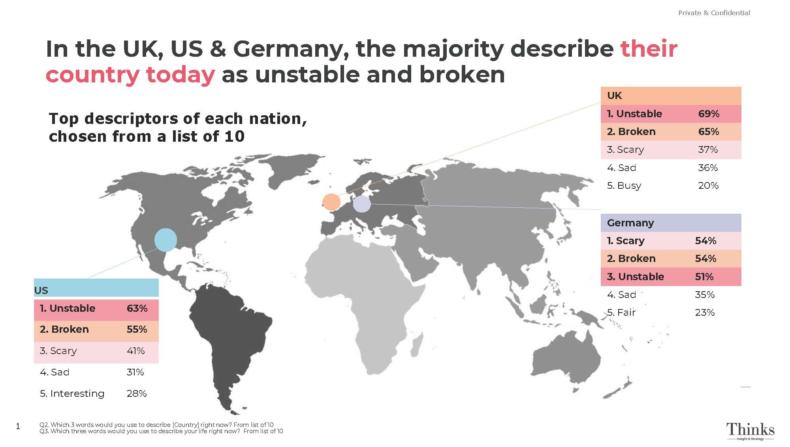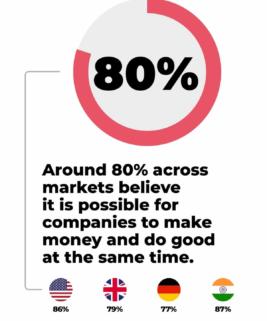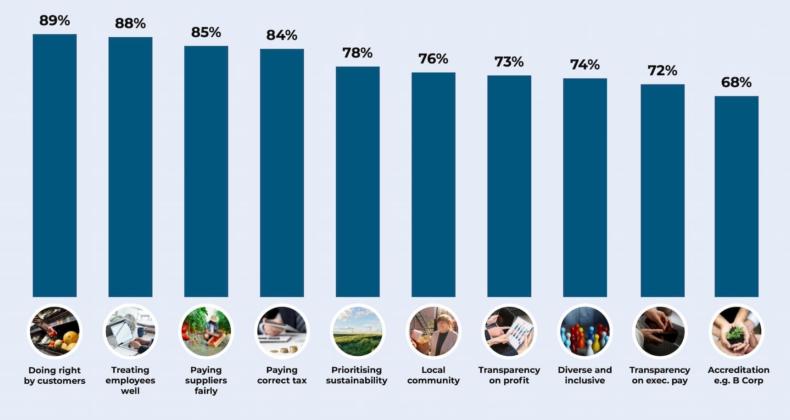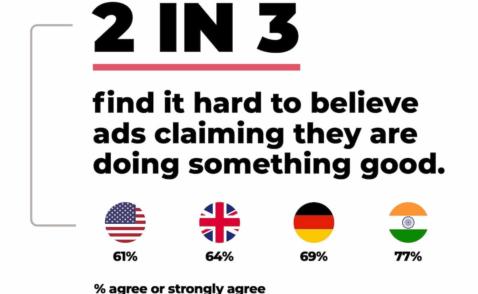Tags: Ethical Values
At the end of last year, Thinks Insight and Strategy ran a research series which tried to understand the current role of ethical business in the world. In this week’s IBE Blog, Thinks Insight and Strategy update us on their findings.
In tumultuous times, business can take the lead in guiding more ethical consumption choices.
With the cost of living still dominating the public’s concerns, our initial findings about global sentiment made for fairly grim reading (see the chart below) but, once we got past the more depressing aspects of national feeling, we started to see some shoots of optimism. The primary source of this optimism was the evidence we uncovered for a consumer centric approach to more ethical, purpose driven business practice.

If you’re an IBE Supporter, you hardly need convincing that acting more ethically in business is the right thing to do. However, one of the core arguments for placing less emphasis on ethics is that there is limited evidence that increased ethical conduct is causally linked to increased profit. Proponents of this view contend that, while consumers say they want businesses to behave more responsibly, what they do is continue to make purchases based on price and convenience.
The say/do gap is a well-established phenomenon in consumer behaviour where desirability bias and a range of other behavioural, social and material realities mean the attitudes we express do not always match our actions. To contend that the say/do gap is a good reason not to pursue greater ethical standards in business misses the point though. Consumers are not wrong or silly when they express a desire to shop more ethically that they do not then fulfil, this merely demonstrates the reality that the ethical choice is not always straightforward or affordable.
The responsibility for making ethical choices straightforward and affordable increasingly sits with businesses and brands. With wider availability, the say/do gap will close, and we have direct consumer evidence below as to why this is and why businesses should take the lead now.
The evidence for a consumer centric approach to business ethics:
1. There is a strong appetite for, and belief in, profit with purpose; the say/do gap won’t persist forever when the ‘say’ is this strong.

(Polling of a nationally representative audience of 2000 people from each of the UK, US, Germany and India in Autumn 2023)
A similar proportion (84%) agree that, as a society, we need to find a better balance between doing good and making money. Our data also shows that demonstrating some good in the world strongly influences planned purchasing behaviour, with consumers willing to buy more and more often from companies who show this:

With this sentiment forcefully expressed, it behoves businesses to act now by investing in ethical practices and communicating them authentically to avoid swimming against the tide of public opinion.
2. Ethics means many things to many people, but consumers consider fairness to be the foundation of ethical business.
Top four indicators of an ethical business:

This finding should encourage and energise consumer facing businesses; there is no need to reinvent the whole organisation or pursue unrealistic ESG objectives in a short space of time. Demonstrating these core principles will meet consumers where they are in thinking about what constitutes a ‘good’ business.
How important are each of these in informing your opinion about how ethical a company is?
Showing % Important – Global average

It’s important to note that sustainability, inclusivity and community efforts are important to a high proportion of consumers as well but fall significantly behind these four indicators. Such elements can complement and build on a strong foundation of fairness.
3. Consumer cynicism has softened to scepticism in response to communications about a company’s ethics.

In isolation, this finding provides little hope. However, set against the evidence above that 80% or 4 in 5 respondents believe it is possible to do good and make money, suggests something else may be going on. Doubt over authenticity in this type of advertising is a good sign, showing a critical mindset and a desire for more robust evidence that businesses really are doing something good before they can be believed.
This is another challenge businesses should be energised by when putting consumers at the heart of their purpose driven strategy. It should be viewed as a battle to convince open-minded sceptics who want to believe but need more and better evidence of the good businesses do, rather than hard-headed cynics who will never believe you no matter how much evidence they are presented with.
Final thoughts
Approaching business more ethically makes intuitive sense to most of us but there is understandably resistance when doing so is framed as a potential threat to the success and profitability of a company. The evidence above provides a starting point to soften this resistance and some impetus for aligning more closely with consumers when it comes to ethical practice. Thinking long-term, calls for higher ethical standards are only going to grow so putting consumers at the heart of your thinking now will surely pay dividends in the future.
Author

Jon Edwards
Director, Thinks Insight & Strategy
Jon Edwards is a Director at Thinks Insight & Strategy. He has over ten years of experience helping consumer brands better understand their target audiences. A strong proponent of mixed method approaches, Jon specialises in drawing together a variety of sources to extract clear insight which brings brands closer to customers. His work spans a wide variety of sectors including technology, fintech, media, sports and FMCGs. His most recent work has involved understanding underlying human values, emotional needs and how these can inform product innovation, the user experience and marketing communications.
Thinks is a global insight and strategy consultancy. Using pioneering research skills and outstanding thinking we help our clients make better decisions, drive positive behaviour, communicate more persuasively, and engage more effectively. Thinks is majority owned by an Employee Ownership Trust, an MRS Company Partner, ESOMAR accredited, and a certified B-Corp.
